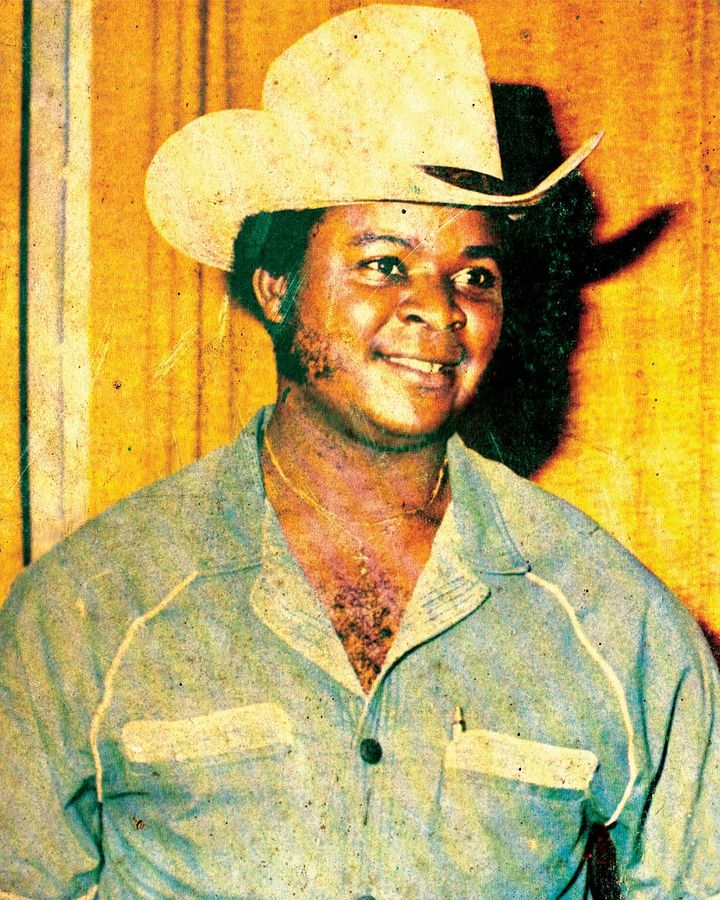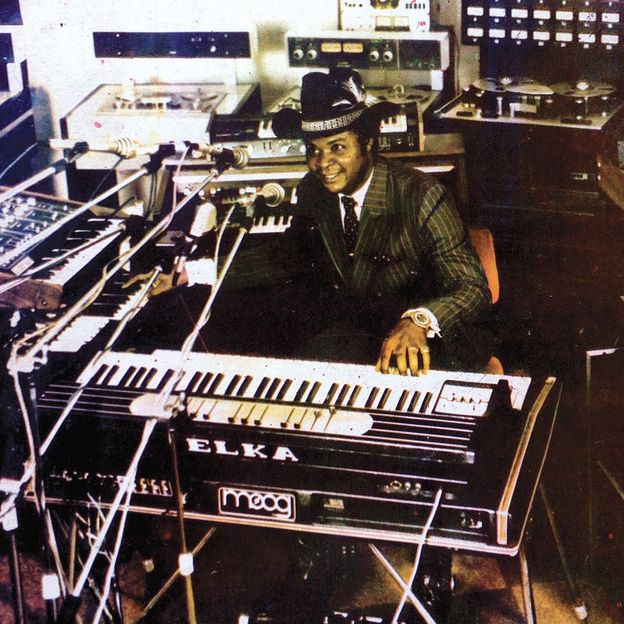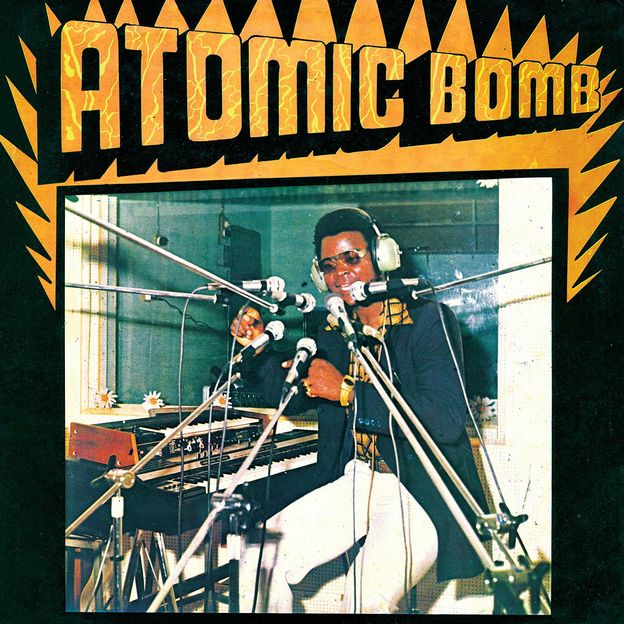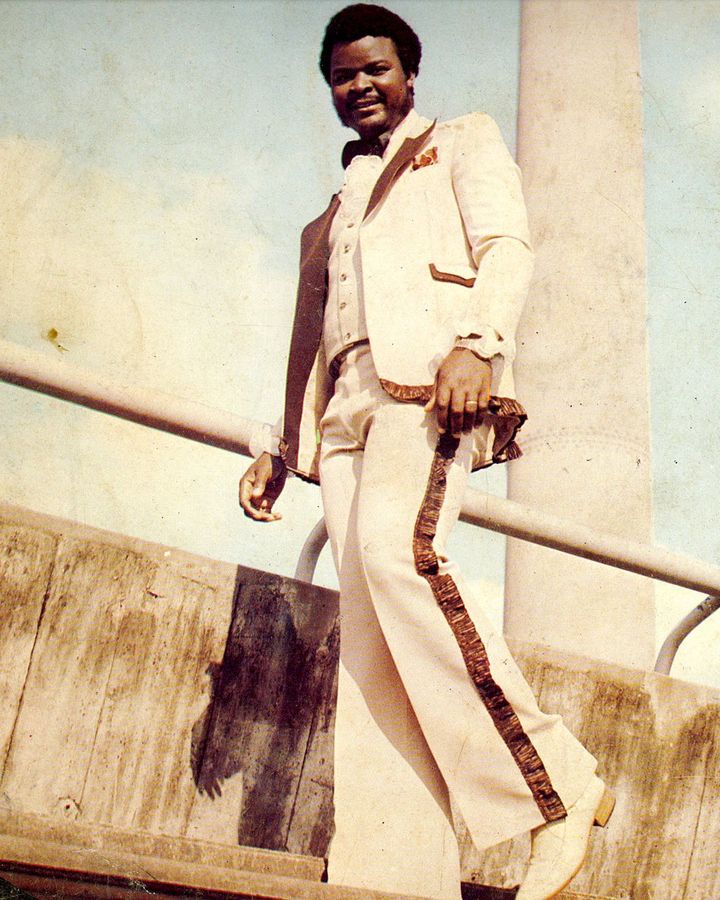One of modern music’s greatest enigmas

He produced eight albums of his own music between 1977 and 1985 in a high-tech studio in rural Nigeria, and then gave up music completely, devoting himself to Christianity. In the years that followed, he achieved cult status across the world, and in 2009 a Nigerian-American music writer decided to put a compilation of his music together with backing from David Byrne’s record label Luaka Bop – but the elusive figure proved difficult to track down. Finally, in 2013, the album was released and praised as one of the records of the year. It was titled, fittingly, Who Is William Onyeabor?
Sporting a short afro that went perfectly with his signature cowboy hats and stylish suits, William Ezechukwu Onyeabor – who died in 2017 at the age of 70 – has been described by The New York Times as “a cipher with a tantalisingly mysterious back story”.
More like this:
– How Amazing Grace was written by a slave trader
– The radical rock bands who changed Germany’s image
– Why a 35-year-old folk anthem became one of the songs of 2023
“The thing about my father is that he was not a man who was moved by fame or money,” Onyeabor’s eldest son Charles Onyeabor tells BBC Culture. “He was extremely talented in many ways and preferred a quiet life of great impact to glory and noise. He loved music but was largely disenchanted with the fame that came with making music and this was why it was easy for him to give up making new music. When he did, he had so much more going on for him and he never really stopped filling his space with music.”
Like his looks, Onyeabor’s music had a distinct style. The production was ahead of its time and contained component elements that would eventually become popular years after he had stopped recording. The music Onyeabor made from his little studio in Enugu in the 70s and 80s was nothing like the music coming out of the rest of Nigeria. Not even Lagos, the entertainment hub of the country, had studios or people with the skill set to produce synthesised electro-afro-funk. According to Luaka Bop, Onyeabor was “Nigeria’s answer to synth-pop and New Wave”.

Onyeabor’s sartorial and musical choices made him an ‘outernational’ artist, existing beyond geographical boundaries (Credit: Courtesy of Luaka Bop)
“The traveller knows better than the aged” is a popular Igbo adage that can explain the cosmopolitan sound of Onyeabor’s music. William Onyeabor’s father, a preacher and merchant trader, and his wife had all their eight children while living in Benue State, Nigeria, away from their home in Enugu State.
After his primary education, Onyeabor moved to Mamfe in Cameroon for his secondary education. In Cameroon, Onyeabor – who already spoke Igbo, Idoma, and English – also learnt to speak French. During this time, Onyeabor’s father died and his mother immediately became a merchant trader herself, moving goods across Nigeria.
Emerging from conflict
When Onyeabor returned home at 21, it was to a country at war. The Nigerian Civil War (1967-1970, fought over the breakaway state of Biafra) had just begun, and he served in the Biafran army as a secretary and French translator, sending signals and correspondence to various units of the army.
After the war, Onyeabor formed a drama group that staged plays for free at the Nnamdi Azikiwe Stadium in Enugu before travelling to France to study cinematography. While there, Onyeabor honed his sound production skills.
When he returned to Nigeria, he married his wife, Jacinta Amoge Onyeabor, in a secret wedding and opened his recording studio at 45 Edinburgh Road, Enugu. It was at Edinburgh Road that Onyeabor recorded and released his albums, including Crashes in Love, Atomic Bomb, Tomorrow, Body & Soul, and Great Lover. At the studio, he also produced and manufactured vinyl records, as well as recording music for other artists.

An electro-synth pioneer, Onyeabor kitted out his studio with equipment from around the world (Credit: Courtesy of Luaka Bop)
According to Charles Onyeabor, “Edinburgh Road was the centre of media and film corporations in Enugu in the 70s and 80s. By the time I was born, my father was already making records. He took me to the studio and to everywhere he went from the moment I could walk. He had me sit in on meetings even though I was too young to say anything.
“Looking back at it all as an adult, I believe he moved with a constant consciousness that he was not going to be alive forever. At a very young age, I knew his studio was the biggest in Nigeria. Its sound production was very high-tech, with 64 multi-track machines installed as early as 1981. Of course, I did not understand the impact of this or the exact words to express it at the time, but I was well aware of it.”
Onyeabor’s friend, the post-civil war football legend Dominic Nwobodo, recalls visiting this studio often in the 80s. “He [Onyeabor] set up a studio on a storey building in New Layout. It was very high-tech. He imported the instruments from overseas and recorded his songs and other people’s songs there.”
By the release of one of his biggest hits, Atomic Bomb, in 1978, Onyeabor’s craft was as recognisable as his cowboy hats. The song starts simply with a few piano chords, followed by a bass guitar, drums, a tambourine, an acoustic guitar and strings, all merged and blended in an audio brew of jazzy afro-funk. Onyeabor’s voice comes in after almost a minute, leading a call-and-response exchange with backing singers. After two minutes, Onyeabor leans in heavily on the synthesiser for the musical effect he is known for.

Released in 1978, Atomic Bomb was one of Onyeabor’s biggest hits (Credit: Courtesy of Luaka Bop)
According to Luaka Bop, “Onyeabor’s dance anthem played on fears that were very real at the time – and still are.” Nigerian DJ Temitope Kogbe told the record label: “Though the Cold War… had petered off in the West, Africa was the new theatre for this confrontation… So the Cold War and its threat of atomic bomb was still very much in the spirit of the times when the record was released in 1978.”
Beyond the eight-minute song, the five-track album of the same name exemplifies a quintessential Onyeabor record in its songwriting, recording, and production. As with each of his albums, it covers themes of love, war, appeals for world peace, and treating fellow humans better. Onyeabor’s values and character are laid bare in his songwriting.
In an active music career that spanned almost a decade, Onyeabor explored different sub-genres. With a style that relied on synthesising sounds to create a form of electronic dance music, Onyeabor took inspiration from his life experiences for both his songwriting and his sound production. Onyeabor included electro-modified sounds from his very first album.
What anyone unfamiliar with Onyeabor’s Nkanu culture would not know is that, though synthesised, the music in the song Jungle Gods from his first album, Clashes in Love, comes from sounds that traditionally accompany masked spirits in Nkanu. “He was a remarkable young man who got inspiration from just about anything. He did not speak much, but he did much, and he was always inspired and always had new wonderful ideas,” says Nwobodo.
Nothing tells the story of William Onyeabor’s life like his music. His entire discography shows us his sophistication from years of travels around the world, and his songwriting carries his values in three recurrent themes – family love, war and peace, and love for all of humanity informed by his Christian faith. Nothing explains his dedication to his family better than the words of Charles Onyeabor. “My father did not joke with his family. He took me everywhere and provided all we needed. Even when he and I began to disagree as I became a teenager, he never allowed that to affect his decisions. He always put our welfare and future first.”
Onyeabor’s fascination with war came from his first-hand experience of seeing unarmed people get killed during the Biafran war. On the Atomic Bomb album, Onyeabor sang in his song Shame that if one had some money but never helped the poor, then they ought to be ashamed.

In photos, Onyeabor sometimes embodies the ‘Fantastic Man’ of his song – wearing white flares and a disco suit (Credit: Courtesy of Luaka Bop)
Onyeabor was a philanthropist. “My father was known to support other musicians, especially upcoming ones,” says Charles Onyeabor. “Besides giving those in need money and food, he also funded scholarships for people in my village and provided the village with borehole water and other amenities. And he hated speaking about himself or the good he was doing. He called doing so ‘eye-service’.”
Onyeabor spent some time in Denmark and later Sweden studying electromagnetic engineering. By the 80s and 90s, he was an industrialist. In addition to founding the recording companies Automatic Record Manufacturing Company (ARMC) and Wilfilms, he also set up a semolina flour-producing company, Catapult LTD. “In 1987, my father won the African Industrialist of the Year Award,” says Charles. “He was an excellent boxer and sprinter. He also drew and sculpted. A sculpture of his still sits at the 82 Division Army Headquarters at Abakpa Nike Enugu.” Thanks to his many travels, William Onyeabor was fluent in Igbo, Idoma, Yoruba, English, French, Italian and Swedish Svenska.
Legacy
Charles Onyeabor continues to keep his father’s legacy alive in his music. Sometimes, he works with the kinds of sound his father had been at the forefront of birthing; other times, being his father’s son and unafraid to try new things, he does things differently. “My father did so much that my passion for music came from him, from watching him come alive whenever he was around music. And wherever he was, there was music. It is only natural that I carry on his legacy.”
“Who is William Onyeabor?” was the question that led Nigerian-American music writer Uchenna Ikonne and Luaka Bop’s Eric Welles-Nystrom to Enugu to find out more about Onyeabor just before his songs were compiled and rereleased. But even that did not yield much fruit, as Onyeabor rarely spoke of himself.
Following the 2013 album, a 2014 documentary film, Fantastic Man, explored the myths surrounding Onyeabor and there were live tribute events worldwide by the Atomic Bomb! Band – a supergroup that included David Byrne, Damon Albarn, and members of Hot Chip and LCD Soundsystem.
He might not have liked drawing attention to himself, but with a talent like his and the albums he left us, it is only natural that the world wants to know more about him. William Onyeabor was an electro pioneer: his work with the synthesiser was revolutionary, and his musical output spoke for itself.
As Charles Onyeabor said at the time of his father’s death, “He wasn’t doing his music for the money. He was trying to tell the world how he felt and what he thinks.” Who was William Onyeabor? It’s all there, in his music.
If you liked this story, sign up for The Essential List newsletter – a handpicked selection of features, videos and can’t-miss news delivered to your inbox every Friday.
If you would like to comment on this story or anything else you have seen on BBC Culture, head over to our Facebook page or message us on Twitter.








